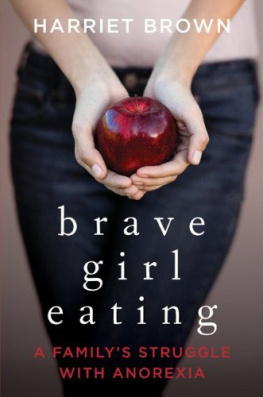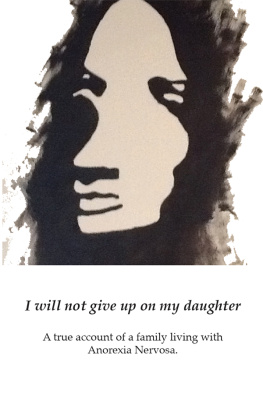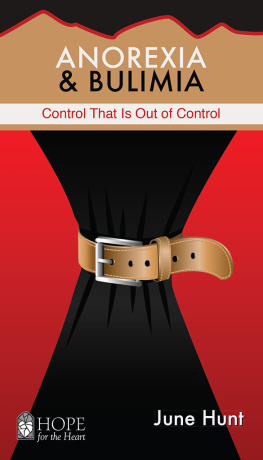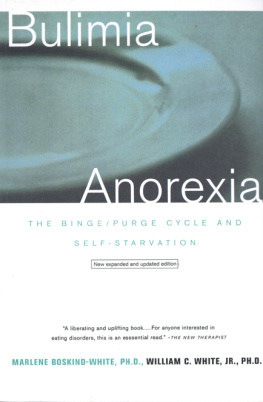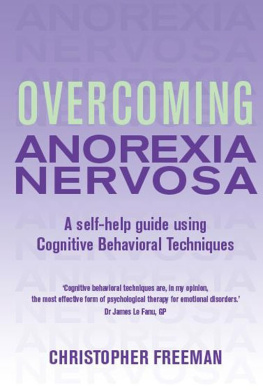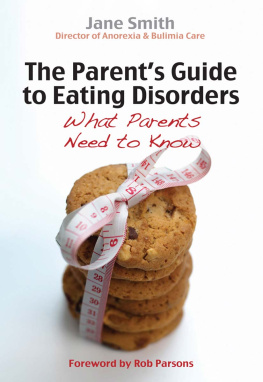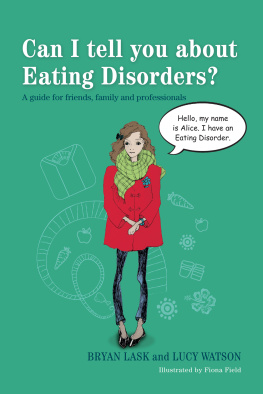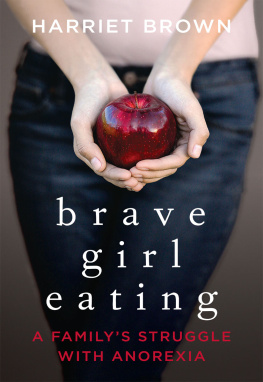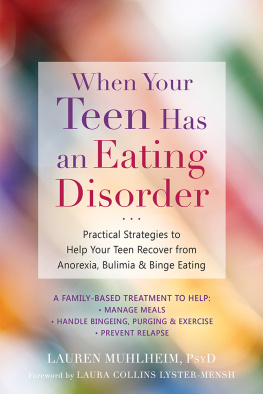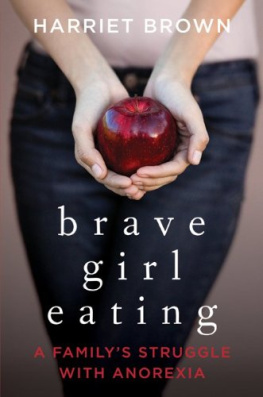This book is for Kitty, and for every young woman or man whos ever struggled or continues to struggle with an eating disorder: for your courage, your strength, your capacity not just to endure but to overcome. I honor you and your families with every word.
The wreck and not the story of the wreck the thing itself and not the myth
A DRIENNE R ICH , from Diving into the Wreck
by Daniel le Grange, Ph.D.
Anorexia nervosa is a serious disorder with devastating psychological and physical consequences. Almost 75 out of every 100,000 people are diagnosed with anorexia nervosa. More specifically, 0.6 percent of adolescent girls are diagnosed with this illness. We have a tremendous challenge before us to determine why it is that young people develop this illness. While we wrestle with this vexing dilemma, however, a more urgent challenge is what can be done to reverse anorexia and its array of devastating consequences.
Despite the crisis associated with self-starvation, few treatments have been tested, and anorexia nervosa remains a confusing trial for sufferers, their parents, doctors, and researchers. One intervention that has received considerable clinical attention is family-based treatment (FBT). In FBT, parents arent blamed for their childs illness; instead, theyre viewed as a crucial resource in bringing about their childs recovery. They are encouraged to be in charge of their son/daughters weight restoration while the therapist acknowledges the enormous difficulties of this task and supports the whole family. Once healthy weight has been restored, some of the developmental issues of adolescence are addressed in FBT.
Brave Girl Eating chronicles the Brown familys ordeal battling Kittys anorexia nervosaa remarkable journey that brings to life the almost unbearable struggle that both Kitty and her family endured. Anorexia nervosa brings about profound psychological as well as physiological changes in the sufferer. These changes are often so severe that it is common for parents not to recognize their offspringto feel This cant be my child. It is easy to see how perfectly competent, loving parents become bewildered and disorganized as they fail to understand this baffling illness. This confusion often makes them second-guess their natural instinct to reach out and help their child. As a consequence, they become immobilized in the face of the seemingly overwhelming power that anorexia has over their child and over them. The Browns story is an uplifting drama as the parents determination and perseverance, as well as Kittys brave efforts, succeed in wresting Kitty away from the eating disorder.
Understanding and treating anorexia nervosa are daunting tasks. But one thing is certain: food is medicine, and recovery cannot come about unless healthy weight is restored. Put more bluntly, one has to eat in order to get better. Many obstacles block the road to recovery, and in Brave Girl Eating the author describes some of these firsthandfor instance, the frustration experienced by both parents and teen when they get stuck in what we call anorexic debates, where even the most rational adult can be convinced by (or give in to) the teens insistence on the caloric value of a salad without a dressing. These debates demonstrate how malnutrition affects the mind and highlight the irrational power of the illness. As Brown points out, The question isnt why but what: What do we do now?
Brown also shares many of the important lessons she and her family learned throughout their ordeal. Most affirming of parents, and valuable from my perspective, is that families (parents) are not helplessthey just have to (re)gain their confidence. This, of course, is no easy task; in fact, it is perhaps one of the most difficult goals to achieve in battling anorexia nervosa. But with the support of the therapist, parents have to stand up and face this illness, with love and caring. Kittys story demonstrates anorexias awful power over the teen sufferer and over the desperate parents trying to rescue their child.
Brave Girl Eating highlights some commonly held misinformation about anorexia nervosa. By showing us Kittys struggle, the author dispels the myth that anorexia nervosa is a choice. She equates it with other serious illnesses and disorders, and we are reminded that anorexia chooses you! Kittys struggle educates all of us about the turmoil and guilt felt by both patient and parents. Confusion and denial are commonplace as the eating disorder challenges every family member, not just the teen. This book also speaks to the frustration and anguish felt by all parents who try to understand and do something when they suspect their child has an eating disorder. These feelings are exacerbated when parents have to scramble to find a specialist eating-disorders team as they navigate the health-insurance quagmire.
It is all too clear that everyone involved in this battle with anorexia nervosa requires support and guidance. While Kittys family found ongoing support in their pediatrician and other professionals, they did not have access to a local FBT therapist and, instead, conducted the arduous task of weight restoration mostly by themselves. This absence of direct support and guidance no doubt complicated an already demanding task. I agree with the author that having hope is a great gift, and this hope ushered them through many tough times. However, no family who struggles with this awful illness should have to do this on their own.
Notwithstanding many obstacles along the way, Brown and her family have regained their footing, which is evidence of their resilience. Brown has since used her expertise as both a parent and writer to help empower other parents so that they may take center stage in the treatment of their children with eating disorders. Brave Girl Eating serves as a reminder that parents are not to blame for their childs eating disorder; rather, they are a reliable resource in the recovery of their children.
Daniel le Grange, Ph.D., is a professor of psychiatry and behavioral neuroscience and the director of the Eating Disorders Program at the University of Chicago.
Impurities creep into every memoir for the simple reason that memory is fallible and you dont know, when youre living through an experience, that youll someday be writing about it. (Even if you do know, walking around with a tape recorder doesnt play well in everyday life.) Then of course theres the question of perspective: two people can live through the same experience and remember it very differentlyespecially members of the same family.
Those issues become even more urgent when a memoir describes the lives of children, especially your own children, who are vulnerable in a variety of ways and who cant in any real sense give informed consent to being written about. Its one thing to expose your own life; its quite another to expose the lives of your kids. As a longtime journalist and, now, a professor of journalism, I think a lot about whats ethical and what isnt. In this book, I considered the line between openness and exploitation. My intention here is to tell the truth as ethically and as compassionately as possible. To protect my children Ive given them false names and disguised some of their physical and other characteristics.
Deciding to tell this story was a process for me and my family. We discussed it over a period of months, weighing the potential for good against the possibilities of harm. I give much credit to my daughter Kitty, who overcame her own preference for privacy out of a wish to help others. Shes a brave and unusual young woman.
As for the vagaries of memory, I kept an extremelyone might even say obsessivelydetailed journal during Kittys illness, partly to keep track of her progress and treatment, and partly to keep myself from drowning in anxiety. In the journal I recorded many conversations more or less verbatim, and recapped others. The events I describe in this book are based on my recollections and on that journal. In a few instances Ive conflated situations in order to compress the story line, but every conversation and event in this book is true and did happen as described, as far as I recollect.

